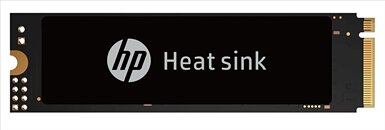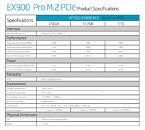Monday, May 11th 2020

HP to Release EX900 Pro M.2 NVMe 1.3 SSD
HP is reportedly looking to releases a next-generation storage device in the form of the EX900 pro SSD. Next-generation because this SSD will ship with the NVMe 1.3 protocol over a PCIe 3.0 interface (4x). HP is quoting maximum sequential read and write speeds set at 2095 MB/s and 1965 MB/s for the 1 TB version, which will obviously be the best-performing among offered capacities (256 GB and 512 GB). Random read and write IOPS are quoted at 283 K and 286 K, respectively. Apparently, the EX900 Pro features an independent cache design, though the original report is extremely scarce on details; for this to be relevant, it should be something different from the usual DRAM and SLC-caching that is usually employed by the best-performing SSD drives.
The EX900 Pro will ship with 3D NAND of unspecified layer topology, though the 5 year warranty given across the board is a welcome sight; TBW ratings are set at 650 TBW for the 1 TB version, 320 TBW for the 512 GB, and 160 TBW for the 256 GB one. The NVMe-based SSD will also offer support for NANDXtend error correction code (ECC) technology, SRAM ECC and end-to-end data path protection technology. No word on pricing or availability was available at time of writing.
Source:
Guru3D
The EX900 Pro will ship with 3D NAND of unspecified layer topology, though the 5 year warranty given across the board is a welcome sight; TBW ratings are set at 650 TBW for the 1 TB version, 320 TBW for the 512 GB, and 160 TBW for the 256 GB one. The NVMe-based SSD will also offer support for NANDXtend error correction code (ECC) technology, SRAM ECC and end-to-end data path protection technology. No word on pricing or availability was available at time of writing.



12 Comments on HP to Release EX900 Pro M.2 NVMe 1.3 SSD
> PCIe 3.0
(a) is not compatible with (b).Technically anything is a sink for heat.
I'm waiting for marketing that claims their product comes with a heatsink, and it ends up being just air.
I have 512GB m.2's from a few years ago that are way faster, so what exactly is "next gen" about these ?????
and just for the record, I have NEVER been impressed by the speeds (or lack thereof) of any of Intel's m.2 drives... they simply don't offer any kind of value to anyone who is looking for a fast, reliable, and reasonably priced drive.....